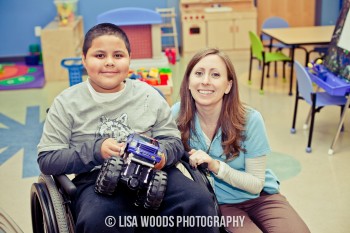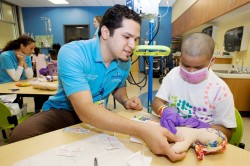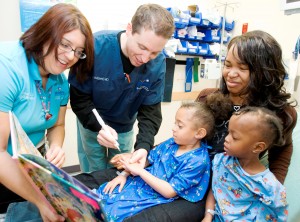Babies who have spent time in the NICU have higher rates of rehospitalization than other infants. Even if your child was only discharged from the NICU a few days or weeks before needing to return to the hospital, you will most likely find yourself in the Pediatric Intensive Care Unit instead of the familiar NICU. Fortunately there are professionals there who can help you with the transition. We talked to Anne Claire Hickman, CCLS, CIMI, Child Life Specialist, at Dell Children’s Medical Center of Central Texas, to find out more about what she does and how it impacts families.
What is your title and what was your program of study?
I am a Certified Child Life Specialist. I studied Human Development and Family Sciences.

Anne Claire at work
What sort of licensing and certification do practitioners in your field go through? What professional associations are you a member of?
The requirements for becoming a Child Life Specialist are to complete a 600 hour internship which then makes you eligible to sit for the national certification exam. Our national professional association is the Child Life Council.
What Does a Child Life Specialist Do?
Research confirms the traumatic effects of hospitalization on children. Using our training in child development Child Life Specialists provide psychosocial support to children and families in the health care setting. The goal is to help each family cope more effectively.
Some of the things I help parents with are:
- Understanding a new diagnosis.
- Preparing their children for their health care visits.
- Addressing their concerns and worries over their children’s health and outcomes.
- Planning for hospital stays, procedures, and surgeries.
- Making informed medical decisions that respect their family’s values.
- Identifying non-pharmaceutical pain management techniques.
- Finding developmentally appropriate language and explanations for communicating with their children.
- Understanding typical, age-appropriate responses their children might have.
- Discovering the value of therapeutic play.
I help young patients and their siblings by:
- Guiding them as they process the emotions they are experiencing.
- Helping them to regain the sense of control they have lost.
- Offering expressive therapeutic outlets like art, music, and story
- Using toys, dolls, and pictures to engage in therapeutic, child-directed play with them.
- Connecting patients and siblings with emotional support through peers and community groups.
- Preparing siblings for visiting their brother or sister in the hospital.
Since I am specific to the PICU and palliative care team, my focus is often:
- Supporting families through the most difficult and intense times in their child’s health care history.
- Helping siblings cope with traumatic events and their immediate and long term effects.
- Preparing for the end of their child’s life.
- Making memories and building a legacy for their children.
Find out about the Complex Chronic Illness Parent Advisory Group (CChIPAG) at Dell Children’s Medical Center.

Photo credit: Anne Claire Hickman
When would a family come and see you?
A family would see me or another child life specialist when visiting the hospital on any unit, whether in patient, out-patient, or the Emergency Room. I am specifically located in the Pediatric Intensive Care Unit and also work with the Palliative Care Team with children with complex chronic illnesses.
What roles do the parents need to play?
When it comes to helping children cope, we believe that the parents are key. They are the real experts when it comes to their children. We depend on them for information and insights to help with our assessments and planning. We also believe in empowering parents – since we know that the parents are the child’s first and best advocates. We want to give families the tools to be strong voices for their children. Ultimately, parents become the experts – providing advocacy in the health care setting, improving their child’s experience, and promoting therapeutic play to help with positive coping.
What resources would you recommend for parents who want to find out more about your field?
I recommend visiting www.childlife.org
And looking at these books:
The Handbook of Child Life: A Guide for Pediatric Psychosocial Care, Ed. by Richard H. Thompson
Child Life in Hospitals: Theory and Practice by Richard H Thompson and Gene Stanford
Psychosocial Care of Children in Hospitals: A Clinical Practice Manual by Laura Gaynard, et all.
Play Therapy: The Art of the Relationship by Garry L. Landreth
How to Talk So Kids Will Listen and Listen So Kids Will Talk by Adele Faber and Elaine Mazlish.

